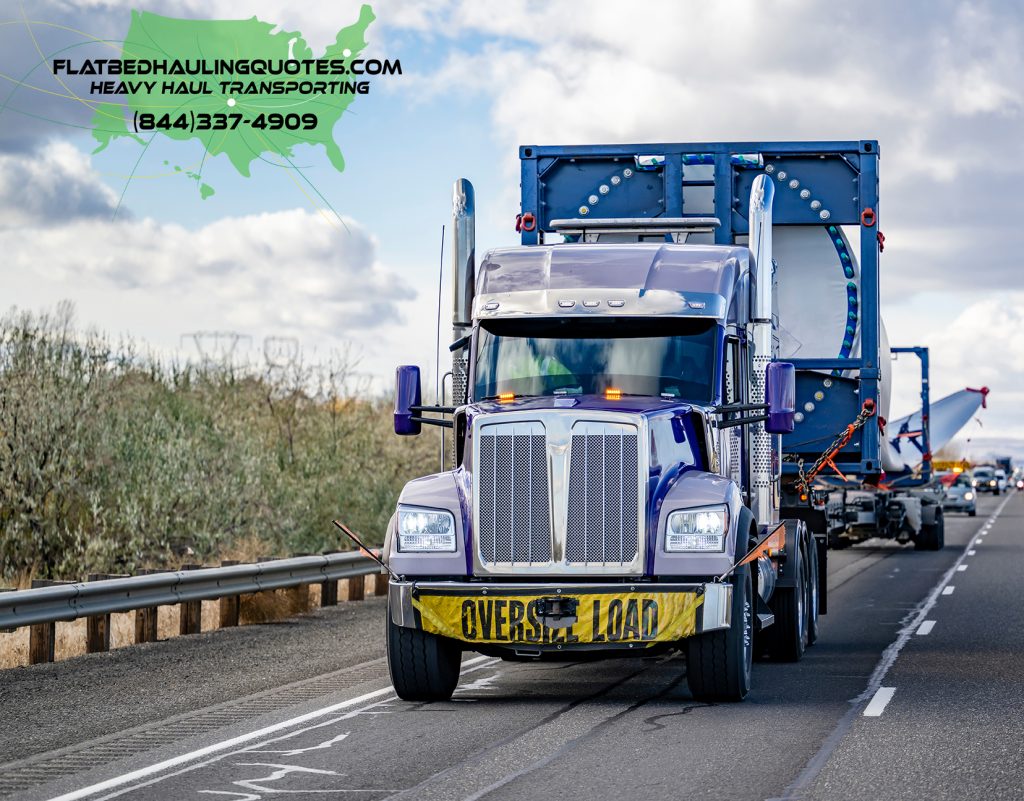Flatbed Hauling Trucking Companies, Flatbed Freight Shipping Rates, Transportation Quotes
Wide load trucking hauling overwide loads can seem unnerving at first, especially if you are transporting a shipment for the first time. You probably have tons of unanswered questions and no reliable source of information. Owing to all these factors, wide load trucking often comes across as a daunting challenge.

However, the good news is that it is easier than you may have imagined. Once you get the hang of it and find the right wide load trucking company, you will be able to breeze through the process and transport your cargo safely in a timely manner without any problems. So, let’s start with the basics. Take a look at some of the most common questions regarding Flatbed Trucking Companies wide load trucking. It will clear up things and you will be ready to send that shipment on its way in no time!
The first thing you need to do is make sure that your shipment classifies as a wide load. A shipment is considered as a wide load if it exceeds the maximum size limit of typical shipments. Generally, loads longer than 48 ’ to 53’ or wider than 8’6” are considered to be wide loads. The maximum weight limit is around 46,000 pounds. However, keep in mind that this is just a general guideline. The exact measurements vary from state to state.
Wide load trucking requires special permits, which is why many people prefer avoiding it if possible. One way is to break your shipment into smaller loads. So, for example, if you are transporting heavy machinery that exceeds the typical cargo limit in your state, you can disassemble some parts and transport them separately. This may keep you from having to obtain Flatbed Hauling Companies wide load permits. However, if your shipment cannot be divided into smaller, lighter parts, there’s no way around wide load
shipments.
Pilot vehicles are used to warn about any accidents, low wires, construction zones, or any other kind of potentially hazardous situation. Shipments wider than 12’ usually require one or two pilot vehicles. However, it is best to look up pilot vehicle regulations in your state as they may vary.
Signage, banners, flags, or lighting may be required to meet the visibility requirements. Remember, when you are on the road, safety should be your first priority. So, make sure you take the time to learn all about signage and banner requirements and follow them to the tee!
You can do everything right, but if you hire an incompetent Flatbed Shipping Companies wide load trucking service, you are almost guaranteed to have trouble on the road. To hire the best wide load trucking service, make sure that they are properly insured, comply with the state-specified safety measures, and have enough skill and experience to get the job done!
If you want the best services, get in touch with Heavy Haul Transportation. We offer the best options for you. When you work with us, you can enjoy amazing benefits. Find out more about our services by giving us a call today!
Oversize Transport Companies from St. Louis Missouri to Arkansas
Oversize Transport Companies from St. Louis Missouri to Alabama
Oversize Transport Companies from St. Louis Missouri to Arizona
Oversize Transport Companies from St. Louis Missouri to California
Oversize Transport Companies from St. Louis Missouri to Colorado
Oversize Transport Companies from St. Louis Missouri to Connecticut
Oversize Transport Companies from St. Louis Missouri to Delaware
Oversize Transport Companies from St. Louis Missouri to Florida
Oversize Transport Companies from St. Louis Missouri to Georgia
Oversize Transport Companies from St. Louis Missouri to Idaho
Oversize Transport Companies from St. Louis Missouri to Illinois
Oversize Transport Companies from St. Louis Missouri to Indiana
Oversize Transport Companies from St. Louis Missouri to Iowa
Oversize Transport Companies from St. Louis Missouri to Kansas
Oversize Transport Companies from St. Louis Missouri to Kentucky
Oversize Transport Companies from St. Louis Missouri to Louisiana
Oversize Transport Companies from St. Louis Missouri to Maine
Oversize Transport Companies from St. Louis Missouri to Maryland
Oversize Transport Companies from St. Louis Missouri to Massachusetts
Oversize Transport Companies from St. Louis Missouri to Michigan
Oversize Transport Companies from St. Louis Missouri to Minnesota
Oversize Transport Companies from St. Louis Missouri to Mississippi
Oversize Transport Companies from St. Louis Missouri to Missouri
Oversize Transport Companies from St. Louis Missouri to Montana
Oversize Transport Companies from St. Louis Missouri to Nebraska
Oversize Transport Companies from St. Louis Missouri to Nevada
Oversize Transport Companies from St. Louis Missouri to New Hampshire
Oversize Transport Companies from St. Louis Missouri to New Jersey
Oversize Transport Companies from St. Louis Missouri to New Mexico
Oversize Transport Companies from St. Louis Missouri to New York
Oversize Transport Companies from St. Louis Missouri to North Carolina
Oversize Transport Companies from St. Louis Missouri to North Dakota
Oversize Transport Companies from St. Louis Missouri to Ohio
Oversize Transport Companies from St. Louis Missouri to Oklahoma
Oversize Transport Companies from St. Louis Missouri to Oregon
Oversize Transport Companies from St. Louis Missouri to Pennsylvania
Oversize Transport Companies from St. Louis Missouri to Rhode Island
Oversize Transport Companies from St. Louis Missouri to South Carolina
Oversize Transport Companies from St. Louis Missouri to South Dakota
Oversize Transport Companies from St. Louis Missouri to Tennessee
Oversize Transport Companies from St. Louis Missouri to Texas
Oversize Transport Companies from St. Louis Missouri to Utah
Oversize Transport Companies from St. Louis Missouri to Vermont
Oversize Transport Companies from St. Louis Missouri to Virginia
Oversize Transport Companies from St. Louis Missouri to Washington
Oversize Transport Companies from St. Louis Missouri to West Virginia
Oversize Transport Companies from St. Louis Missouri to Wisconsin
Oversize Transport Companies from St. Louis Missouri to Wyoming

